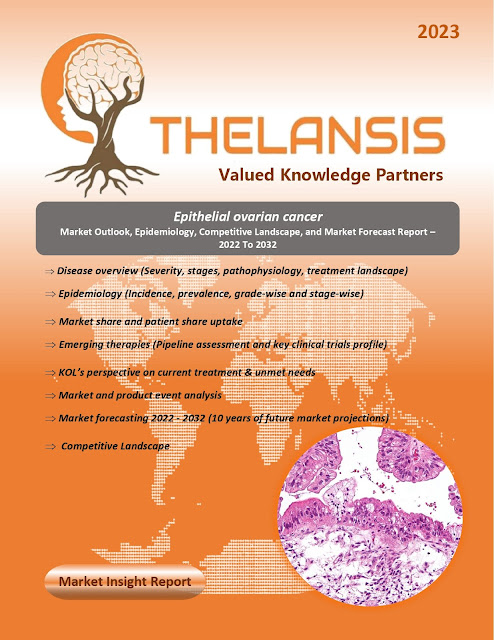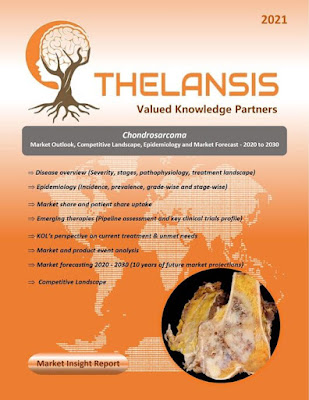Epithelial Ovarian Cancer – Market Outlook, Epidemiology, Competitive Landscape, and Market Forecast Report – 2022 To 2032
Epithelial ovarian cancer is a
neoplastic disease that originates from the epithelial cells that line the
ovary and fallopian tubes. It is the most commonly diagnosed histological
subtype of ovarian cancer, with a median age of onset between 60 and 65 years.
Women under the age of 30 are rarely diagnosed with epithelial ovarian cancer,
with the majority of malignancies in this age group being germ cell tumors.
Symptoms of epithelial ovarian cancer are often nonspecific and include
abdominal bloating, early satiety, nausea, abdominal distension, change in
bowel function, urinary symptoms, back pain, fatigue, and weight loss. These
symptoms typically present months before diagnosis and are more common in the
advanced stages of the disease. Ovarian epithelial cancer is divided into two
groups, type I and type II. Type I tumors are slow-growing and often found at
an early stage, while type II tumors are fast-growing and usually found at an
advanced stage. Type I tumors include low-grade serous, low-grade endometrioid,
clear cell, and mucinous carcinomas. Type II tumors include high-grade serous,
high-grade endometrioid, undifferentiated carcinomas, and malignant mixed
mesodermal tumors (carcinosarcomas) due to their similar epithelial
characteristics. Type I and type II tumors have different molecular and genetic
features, with type II tumors having higher TP53 mutation frequency and greater
molecular and morphologic homogeneity. Type I tumors, on the other hand, are
genetically more stable with a unique pattern of mutations in specific cell
types. The standard treatment for advanced epithelial ovarian cancer is primary
debulking surgery followed by chemotherapy.
·
In the USA, the estimated number of ovarian
cancer was 10.6 per 100,000 women. 90% of all ovarian cancers have an
epithelial origin, while the remaining are non-epithelial.
Thelansis’s “Epithelial Ovarian Cancer
Market Outlook, Epidemiology, Competitive Landscape, and Market Forecast Report
– 2022 To 2032" covers disease overview, epidemiology, drug utilization,
prescription share analysis, competitive landscape, clinical practice,
regulatory landscape, patient share, market uptake, market forecast, and key
market insights under the potential Epithelial Ovarian Cancer treatment
modalities options for eight major markets (USA, Germany, France, Italy, Spain,
UK, Japan, and China).
KOLs insights
of Epithelial Ovarian Cancer across 8 MM market from the centre of Excellence/
Public/ Private hospitals participated in the study. Insights around current
treatment landscape, epidemiology, clinical characteristics, future treatment
paradigm, and Unmet needs.
Epithelial Ovarian Cancer Market Forecast Patient
Based Forecast Model (MS. Excel Based Automated Dashboard), which Data Inputs
with sourcing, Market Event, and Product Event, Country specific Forecast
Model, Market uptake and patient share uptake, Attribute Analysis, Analog
Analysis, Disease burden, and pricing scenario, Summary, and Insights.
Thelansis Competitive Intelligence (CI) practice
has been established based on a deep understanding of the pharma/biotech
business environment to provide an optimized support system to all levels of
the decision-making process. It enables business leaders in forward-thinking
and proactive decision-making. Thelansis supports scientific and commercial
teams in seamless CI support by creating an AI/ ML-based technology-driven
platform that manages the data flow from primary and secondary sources.


Comments
Post a Comment